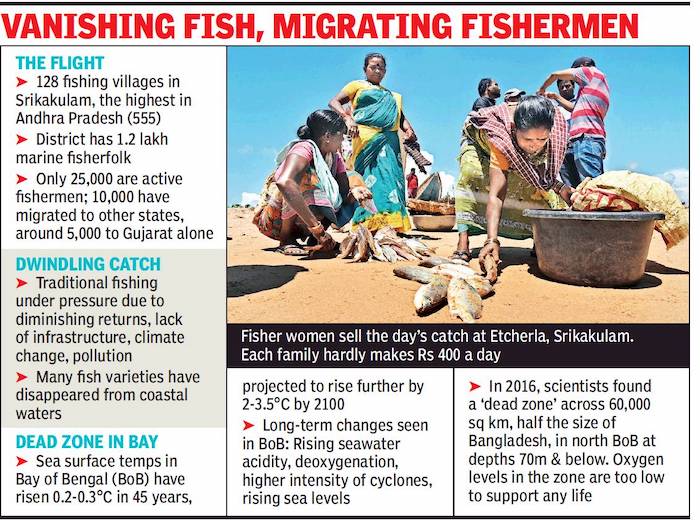Srikakulam
This is a collection of articles archived for the excellence of their content. Additional information may please be sent as messages to the Facebook community, Indpaedia.com. All information used will be gratefully acknowledged in your name.
This is a collection of articles archived for the excellence of their content. |
Drought in sea
As in 2021
Umamaheswara Rao, Nov 9, 2021: The Times of India

From: Umamaheswara Rao, Nov 9, 2021: The Times of India
D Matchelesam village lies quiescently on the shores of Bay of Bengal, 15km from Srikakulam town in Etcherla mandal of Andhra Pradesh. At first glance, it looks no different from any other fisher village. But, as you walk through this tiny hamlet, the haunting emptiness of the place hits home. Over the years, nearly 90% of the resident fishermen have moved out of the village in search of a livelihood.
D Matchelesam, once a relatively prosperous place, is now one of numerous ghost hamlets dotting the coast. About1,000 fishermen have shifted out of the village in the last two decades. In the neighbouring village of Budagatlapalem, that number stands at 800. In yet another village, Badivanipalem, about 500 fishermen have taken to other activities.
Migrations aren’t new to Srikakulam. The latest wave, the third in the past 150 years, began in the 1980s with many fishermen from the district shifting to Paradip in neighbouring Odisha.
For nearly two decades, the phenomenon hardly attracted attention. But the ever-increasing exodus has of late stirred a debate, with growing demands for corrective measures. While conservative government estimates put the number of migrated fishermen from the district at 10,000, many experts say the actual figure is higher.
Fishing ‘droughts’ are now becoming more common
A continually dwindling catch leading to diminishing returns from the sea and lack of fishing infrastructure have been the main reasons why Srikakulam fisherfolk are forced to seek employment elsewhere. Overfishing and pollution from effluents discharged into the sea have been long standing problems.
Adding to this mix in recent decades is global warming. There’s evidence of longterm changes in seawater temperature, acidity, deoxygenation, increasing intensity of cyclones and sea level rise in the Bay of Bengal, all of which impact the marine ecosystem and productivity, habitats and biological processes. Fishing “droughts”, that is, failure of a fishing season, are becoming more common. According to a research study by the Central Marine Fisheries Research Institute, the marine environment along Andhra Pradesh is steadily warming. The study also observed early maturation of species.
Fishermen from Srikakulam now dominate fishing activities in various ports of Gujarat. They are found in every major port city of the country, be it Mangalore in Karnataka, Andaman and Nicobar Islands, Balasore and Paradip in Odisha or Goa and Mumbai.
Koda Suryanarayana, 37, from D Matchelesam village, migrated to Gujarat when he was just 14. “The migration began about three to four decades ago when fishermen from Srikakulam started establishing settlements in the port cities of Odisha. Consequently, the newly established Kandla Port and Veraval also embraced the fishing community from this area,” says he.
Another migrant to Gujarat, Mylapalli Hari (38), says they hardly earn Rs 15,000-20,000 a month in other states based on nature of work and specialisation.